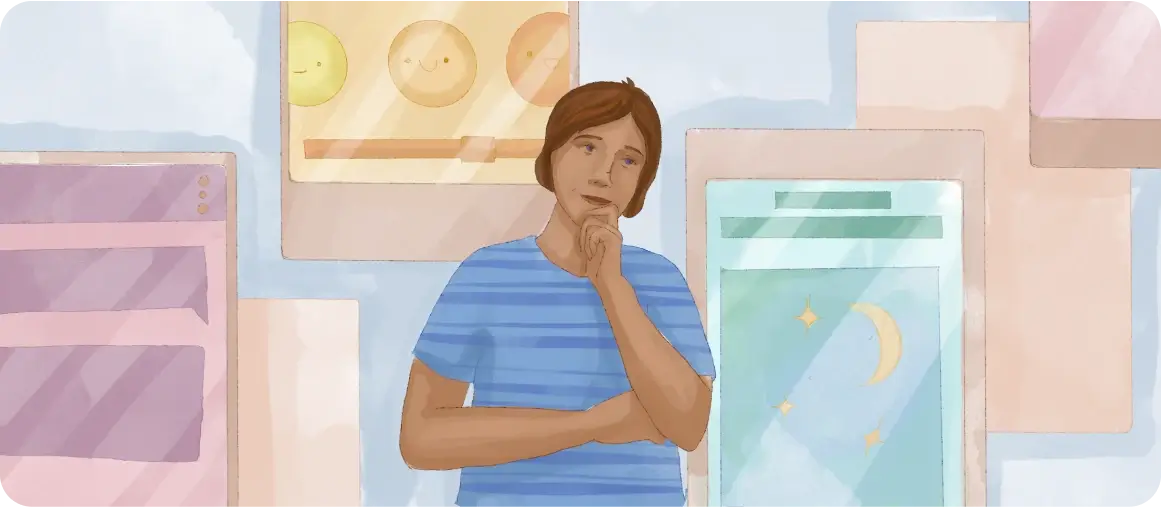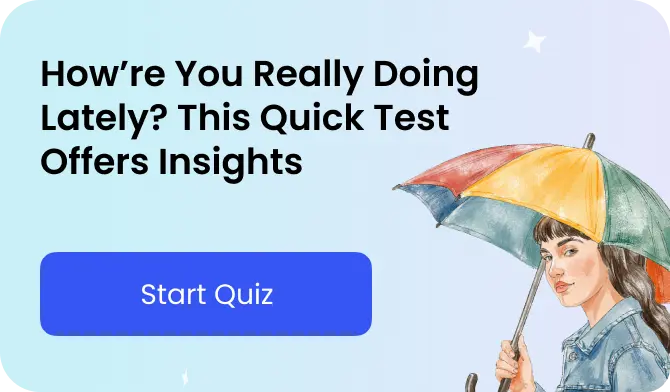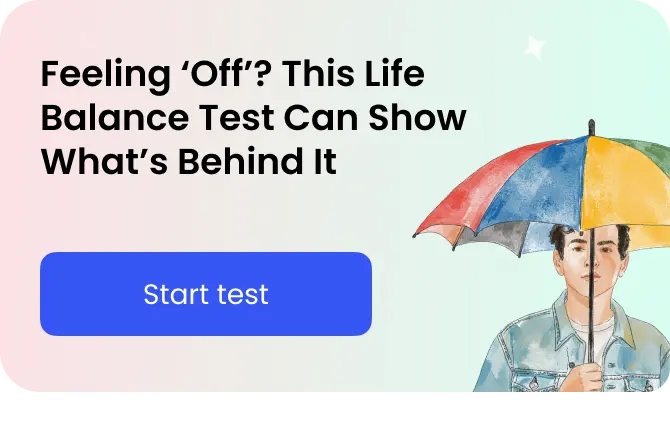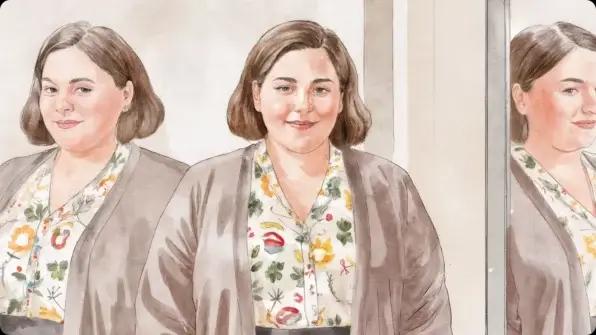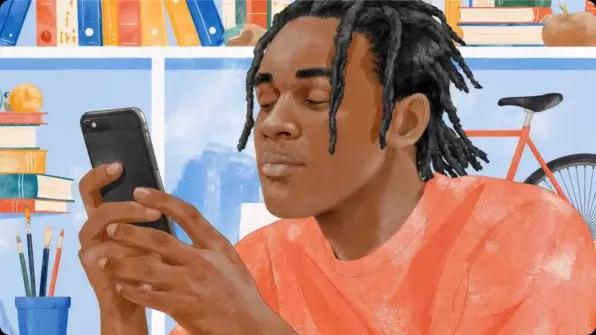The whole world is in your hands. Have you ever considered your mobile phone a gateway to endless opportunities, where every swipe opens a new door?
With just a few touches, we can do anything. Discover the hottest trends on TikTok, plan your next adventure with Airbnb, find your perfect job on LinkedIn, or watch the latest movies on Netflix — anything!
Of course, taking care of your well-being isn’t an exception. There are hundreds of mental health apps that can become handy tools for a more fulfilling life.
Gauge insights for better self-understanding? No problem. Find a therapist who perfectly fits your needs? Easy!
But how can you choose the best wellness apps that are user-friendly, effective, and tailored to your unique needs?
Actually, we’ve done it for you. Check out our guide on the apps that help with mental health, and download the ones you like most. Your journey to well-being is just a tap away!
Pro tip from Ashley Coon, MA, Provisionally Licensed LPC, “Mental health and wellness apps are wonderful ways to work towards our mental health goals. From mood tracking, to mental health self-reported assessments, to virtual therapy, all of the mentioned apps offer a wide variety of helpful tools and functions to promote mental well-being.”
Top Picks for the Best Mental Health Apps
So, you open the App Store or Google Play and… get lost. There can be hundreds and even thousands of apps that seem exciting and engaging.
But wait. What were you looking for in the beginning? A meditation app, a mood-tracking app, or maybe an application with everything at once?
If you already understand it, you’re halfway there. Check out the best mental health apps in 2024 so you won’t get lost when choosing the right one.
- Best all-in-one mental health app: Breeze
- Best for talk therapy: BetterHelp
- Best for chat therapy: Talkspace
- Best for mindfulness: Headspace
- Best for sleep: Calm
- Best for mood tracking: Daylio
- Best for meditation: Balance
- Best for setting goals: The Fabulous
Quick Comparison of Mental Health Apps
Well, the list seems pretty promising. However, we understand if you want to learn more before trying some.
Check out the table of health and wellness apps to discover their price, rating, and features. Whether you’re seeking breathing exercises or space for journaling, there’s something for everyone.
| App Name | Rating | Main Features | Free Trial | Price |
| Breeze | 4.5 | – Science-based tests for self-discovery – Quick psychological courses – Mood tracking and other journaling routines – Games for relaxation – Personal routines based on your goals – Social features (opportunity to share your test results with friends, family, or a therapist) | 7-day free trial, but you can select a contribution from 1 USD to 17.34 USD | 29.99 USD / month |
| BetterHelp | 4.8 | – Individual, couple, and teen therapy – Opportunity to choose a therapist based on your needs, preferences, and location – Live 1-1 sessions with a therapist – Messenger for 24/7 communication with a therapist – Group sessions and webinars | No | 65-100 USD / week (depending on the plan) |
| Talkspace | 5 | – Individual, couple, teen therapy and psychiatry – Live 1-1 sessions with a therapist – Messenger for 24/7 communication with a therapist – Symptom tracker and opportunity to set long-term goals – Mindfulness exercises for building healthy habits | No. You can get some coverage from insurance / from the employer. | 69-109 USD / week (depending on the plan) |
| Headspace | 4.9 | – Daily meditations – Sleep sounds – Meditations & mindful activities – Podcasts – Videos & courses – Self-care exercises – Guided runs, yoga & mindful fitness – Progress tracking & daily reminders | 7 or 14-day free trial | 94.99 USD / year or 12.99 USD / month |
| Calm | 4.8 | – Meditations with experts – Mindfulness practices – Sleep stories – Breathing exercises – Daily mindful stretching & movement exercises – Soundscapes | 7-day free trial | 69.99 USD / year |
| Daylio | 4.8 | – Mood tracker – Mood chart – Goal tracker – Journaling opportunities – Well-being stats | 7-day free trial | 23.99 USD / year |
| Balance | 4.9 | – Various plans for every goal that teach fundamental meditation skills – Daily meditations – Bed-time relaxation exercises – Well-being skills practice | A year of free trial, but you can select a contribution from 5 USD to 70 USD | 69.99 USD / year |
| The Fabulous | 4.4 | – Goal tracker – To-do list – Personalized daily routines – Daily coaching, affirmations & meditation sessions – Short workouts & breathing exercises – Progress reports – Gratitude journal – Community circles | 7-day free trial | 49.99 USD / year |
This seems simple and easy to understand, right? Nonetheless, this guide to the best mental health apps wouldn’t be comprehensive if we didn’t include all the pitfalls.
Let’s go further and take a glimpse at other important aspects of each app, including all-encompassing overviews, the most important benefits, and roadblocks.
Breeze
If you’re looking for an all-in-one best mental health app, it might be the best option.
The content in the Breeze app is based on cognitive behavioral therapy concepts. This highly effective approach targets negative thought patterns to enhance emotional well-being and behavior.
A focus on CBT ensures that you can transform your cognitive processes and emotional responses, making the journey of self-discovery more impactful.
Breeze offers plenty of science-based tests that allow people to learn more about themselves and their emotions. “Career guidance,” “temperament type,” “extraversion/introversion,” and “imposter syndrome” are just a few from a huge number of tests.
Because of its scientific approach, Breeze can be one of the most effective CBT apps, as it offers dozens of features.
- Quick psychological courses allow you to uncover answers to key questions about yourself and your feelings. They provide useful strategies that make it easier to face challenges and improve your mental well-being. Here, you can find tests on anxiety, love, self-esteem, stress eating, etc.
- A mood tracker is helpful for noticing your thinking patterns and challenging negative beliefs. In the Breeze app, you can note your mood, why you feel a certain way, and your activities. Along with that, you can take photos to recapture the atmosphere. The tracker’s stats are always at hand to recognize patterns and triggers, celebrate victories, and develop strategies for navigating challenges more clearly.
- Relaxation games turn this best mental health app into a personal assistant for your emotions. They allow you to reduce stress after a hard day while making it fun to explore your feelings. Try them to boost your mood and have some fun.
What else puts Breeze at the top of the list of the top mental health apps? One more great feature is about to come to light. Personal routines based on your goals can offer daily practices to help you reach them faster. But let it be our small secret.
Moreover, the mental health app development team releases new updates regularly.
Price: 29.99 USD / month
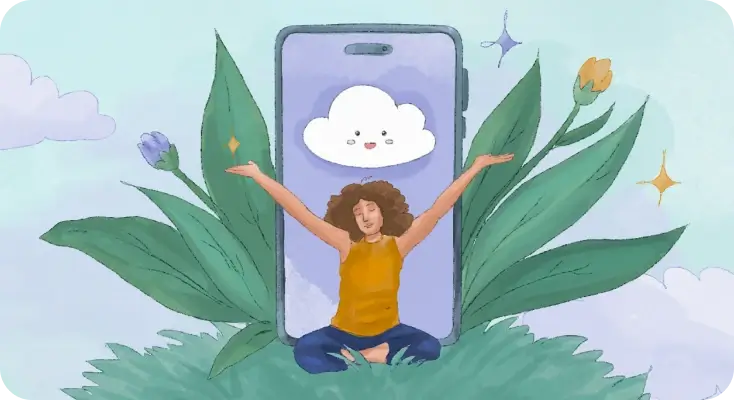
Cons:
- There are no meditations: Breeze doesn’t focus on meditations and doesn’t offer them. Nevertheless, it is one of the mental health game apps with plenty of simple relaxation games that can help you calm down after a long day.
- Rare push-notifications: Do you like to get reminders about opening the app and doing the task every few hours? This won’t happen with Breeze. The app sends notifications relatively infrequently, whether it’s good or bad — up to you.
Pros:
- A vast number of features: Breeze is one of the best apps for mental health because it’s a one-stop shop with almost anything you need to take care of your mental health. In fact, this application can be enough to take a significant step towards improving your well-being.
- Science-based tests: All tests on the app are developed with accredited psychologists based on scientifically proven data. Because of this, Breeze can provide accurate assessments to get you insights into your inner self.
- Personalized recommendations after each test: Once you take a test in the Breeze app, you get a tailored action plan designed specifically for you. These suggestions may help address your unique needs and effectively achieve your mental health goals.
- Safe space without pressure: What makes it one of the best mood tracker apps? It isn’t just a mood tracker! Breeze offers variable opportunities for self-understanding that you can use in a way you want without any pressure.
- Opportunity to share your results with those important to you: Have you discovered something really important and want to share it with someone significant in your life? With Breeze, you can share your results with your therapist or loved ones. Want to hide insights from a particular test? That also isn’t an issue.
- App password to protect your personal info: Last but not least. If you want to keep your data secure, you can go to settings and set up a password for Breeze. This way, you can have peace of mind knowing that your personal information is safely locked away.
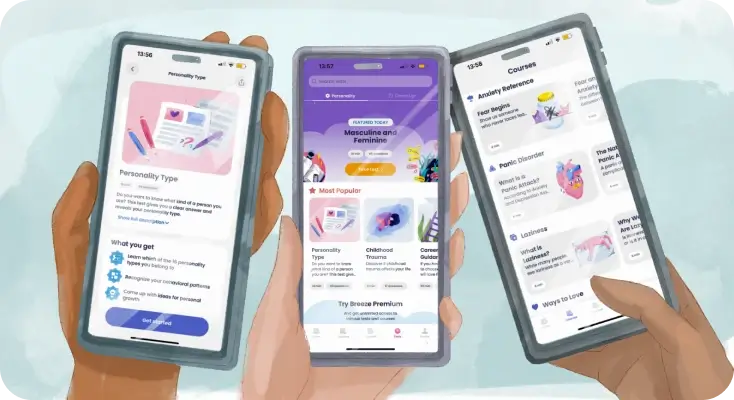
BetterHelp
Are you looking for a talk therapy app to always have your therapist in hand? If so, BetterHelp is a great option.
Once you take a test to identify your needs, preferences, and current state, they connect you with a therapist who fits your needs. You can get in touch with your therapist via text messages, live chat, telephone, and video and choose the format convenient to you.
Share your story, discuss what’s happening in your life, and delve into the challenges you’re facing. The therapist will respond with insights and guidance.
Such continuous one-on-one conversation will provide a supportive, personalized experience that lays a strong foundation for your mental well-being journey.
Price: 65-100 USD / week
Cons:
- A long test before you start working: It’s up to you to decide whether it’s an advantage or a time-consuming task. Nevertheless, BetterHelp is the best app for therapy because it helps you find a professional who truly understands your needs.
- You don’t know the exact price until you finish the test: As BetterHelp states, “Pricing is based on your location, referral source, preferences, therapist availability, and any discounts you have.” Thus, the process of identifying the exact price might seem a bit intransparent.
- BetterHelp doesn’t have a free trial: While this is understandable for therapy services, some may consider this a drawback. You need to pay right after passing the test. However, you can cancel your subscription anytime.
- BetterHelp doesn’t accept insurance: Thus, you can’t cover your expenses and need to pay out-of-pocket.
Pros:
- Over 30,000 therapists in various areas: BetterHelp is one of the best talk therapy apps, and you can find dozens of accredited professionals here. The app states that therapists have at least 3 years and 1,000 hours of hands-on experience. Moreover, all of them are independently licensed therapists.
- 24/7 access to a chat with a therapist: You can reach your therapist at any time and will receive an estimated timeframe for a reply. This provides the feeling that support is always available.
- The simple process of changing a therapist: The app offers a stress-free option of changing the professional you work with. Additionally, you can provide anonymous feedback if you want to.
- If you can’t afford therapy, you may receive financial aid: BetterHelp, obviously, isn’t one of the best FREE mental health apps. But if you’re in a difficult situation, you can reach out to them, and they may consider helping you.
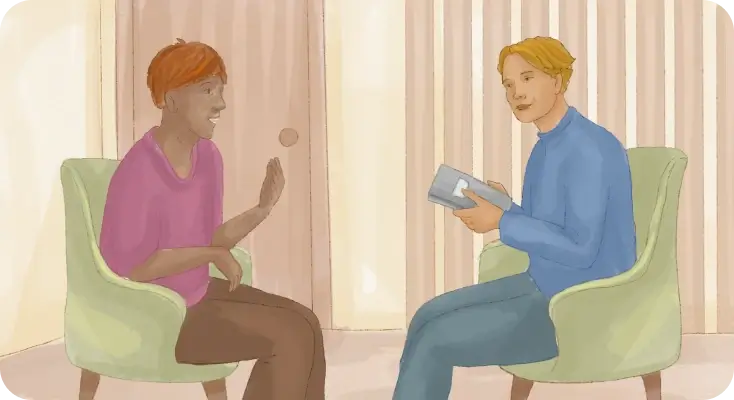
Talkspace
This is one of the stress management apps that is pretty similar to BetterHelp. You take a test — shorter than in the previous app — get in touch with a chosen therapist and start working on your goals.
The main difference is that Talkspace is more about messaging therapy. You can send texts, photos, and video messages and receive feedback as soon as your therapist allows. In more expensive plans, you can also schedule video sessions.
Why can it be one of the most convenient mental health apps for adults? Because you can get treatment and support at any time. Just get in touch with your therapist and receive the help you need right when needed.
Price:
- 69 USD / week — messaging therapy
- 99 USD / week — video + messaging therapy
- 109 USD / week — video + messaging + workshops
Cons:
- 30-minute video sessions: For those who prefer traditional therapy, this may sound like not enough time.
- Text therapy can feel more complicated: Again, it depends on you. Talkspace might be one of the most convenient mental health apps for students who often live with phones in their hands. At the same time, this format may not feel as intuitive or comfortable for all people.
- The features are very limited. As Talkspace specializes in therapy, there are no self-care opportunities. It doesn’t offer well-being tests, mood-tracking opportunities, relaxation games, meditations, and more.
Pros:
- You can get coverage from insurance or the employer: Talkspace states, “Therapy may be free for you.” Most insured users can pay much less. Moreover, many businesses cooperate with the app and cover their employees’ expenses.
- Lots of multimedia sharing functions: With Talkspace, you have therapy at your fingertips, anytime and anywhere. You can contact a therapist whenever it is convenient for you and send photos, videos, or voice messages.
- There is psychiatry and other various services: This is one of the top wellness apps for providing LGBTQIA+ therapy, therapy for veterans, medication management, etc.

Headspace
Lots and lots of meditations and mindfulness practices — this is what you can find in Headspace. What else? It is one of the best self-help apps that offers sleep and concentration-boosting sounds, as well as expert-led stress relief exercises. Headspace even opens up opportunities for personalized coaching.
In a nutshell, this application offers many ways to become more mindful and focus on inner peace.
Price:
- 94.99 USD / year (7.92 USD / month) after 14-day trial
- 12.99 USD / month after a 7-day trial
It’s essential to note that while the pricing is stable, it has many plans. Let’s quickly describe them.
- Coaching. You get personalized support from a mental health coach, 3 monthly text-based sessions, and unlimited app access for 99.99 USD / month.
- Family plan. Six accounts for 99.99 USD / year.
- Student plan. The price is 9.99 USD / year for students only.
- Educators plan. Headspace offers free access to primary-secondary teachers and supporting staff.
- Teens plan. The app is free for teenagers 13-18 years old in the US.
Cons:
- There’s no free content in the app: If you’re searching for the best apps for mental health for free, it isn’t it. All content in Headspace is blocked until you start a trial period. To start this free trial, you need to choose a paid plan.
- All meditations are shorter than 30 minutes: If you’re a newbie, it will be more than enough. Besides, for more experienced users, it can feel like a limit, and they may need to search for longer meditations elsewhere.
Pros:
- There are dozens of meditations that fit your needs: For mental reset, sleep, stress relief, and productivity — whatever you need to do, you can meditate with Headspace.
- Also offers podcasts, short videos, mindful activities, and text content: Generally, the amount of content is significant.
- Free Guest Passes for friends for a month and gifting opportunities: You can invite a friend and provide them unlimited monthly access to the app. Also, buying access to the app as a gift for a year is cheaper than actually subscribing to Headspace on your own.
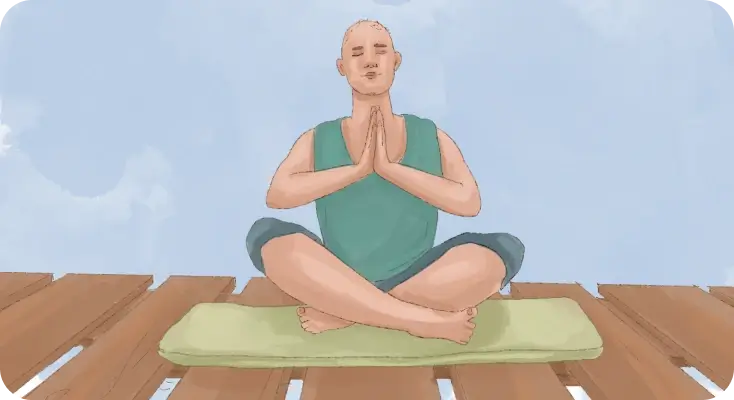
Calm
Some people call it the best-guided meditation app, even though its primary purpose is to help you fall asleep quickly.
Still, Calm has plenty of audio for different purposes. From movement to relaxation, from soundscapes to well-being master classes — the range is impressive. Moreover, it has an extensive library of guided meditations for any need.
Price: 69.99 USD / year
Cons:
- It can be challenging to understand where to start: The variety of content is impressive. However, you can get lost quite easily when you’re only paving your way in mindfulness, meditation, and sleeping with sounds. What to start from and how to continue? This might be confusing.
- Sounds when you open the app may seem distressing: Imagine that you’re listening to music on Spotify and open Calm. The song stops immediately, and you hear the calming sounds of nature. While the sounds are good, in different situations, this change may be annoying.
Pros:
- A lot of various content: This stress relief app can teach you the skill of meditation, help you fall asleep quickly, or learn more about your inner self. In a nutshell, there are lots of things to choose from.
- A handy library (pretty much like YouTube): Calm is convenient because you can quickly find recently played audio, collect playlists, save favorite stuff, and track the history of your sessions.
- Free meditation courses: Even though most content on the app is paid, you can find meditation courses of different durations that are completely free. Additionally, there’s a filter to search faster.
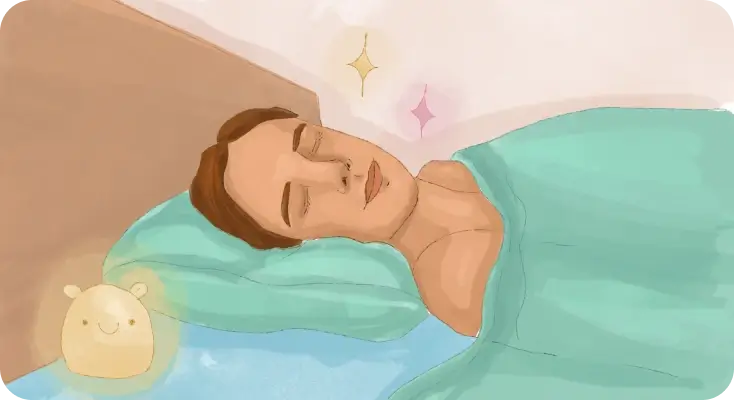
Daylio
Searching for the best journal app to keep notes on your mood, activities, and habits? This micro-diary can be an option.
Daylio is a simple yet efficient private journal that allows you to track anything. Whether you’re building a new habit, learning how different activities influence your mood, or exploring what makes you happy, this symptom tracker app is here to help.
Here, you can track your mood, note the reasons why you experience some emotions, and keep a journal using some prompts. Furthermore, Daylio allows users to add photos to daily notes.
Another feature is the habit builder. You set up a habit and a reminder, such as “drink water every morning at 8 a.m.” Then, you track the progress and see the results.
Price: 23.99 USD / year
Cons:
- Limited variety of features: Although Daylio is one of the great self-help apps, it doesn’t offer a wide variety of opportunities. There are no meditations, mindful activities, relaxation games, self-discovery tests, or other features.
- Automatic backup is available only on premium: If you want to save your progress, you must buy all the features.
Pros:
- Different mood color schemes: You can change the color of the emoji you use to track your emotions. It seems like a small thing, but this adds a bit of personalization to the app.
- Handy activities statistics to understand yourself better: Daylio offers lots of different stats you can use to analyze mood fluctuations. Mood charts, mood counts, year in pixels, and influence on mood are only a few analytical features.
- A great list of achievements: To add gamification, you can earn activities for different things. This might motivate some users and encourage consistent engagement with the Daily.

Balance
Looking for a free mental health app specifically for anxiety and depression? Balance is a perfect choice.
It isn’t free, but some open features can be used without subscribing. Moreover, they currently provide a free trial for a year (the offer is time-limited).
This mental health app allows you to master concentration and breathing skills, calm and quiet your mind before sleeping, release anxious thoughts with mindful exercises, and much more.
Most users like that with Balance, you can quickly figure out meditation fundamentals and do bite-sized exercises wherever you are. You can become an advanced user by progressing through the app, as with Balance, you will always know what comes next.
Price: 69.99 USD / year
Cons:
- There is no yoga or mindful movement: Even though the number of meditations impresses, we can’t say the same about more active practices. So, if you’re looking for more comprehensive apps for mental health, this may not be your choice.
- When you follow the plan, you can’t unlock the next lesson before doing today’s one: Logically, it’s correct. But who doesn’t love a sneak peek at what’s coming next?
Pros:
- Questionnaire on your goals and current state before starting work: Once you download the app, Balance will ask you what you’re looking for. This allows the app to provide a more suitable program and plans to make your meditation journey more effective.
- Plans that allow you to progress in meditations: By the way, what are those plans? These comprehensive courses help users empower their meditational skills step-by-step and daily.
- Progress and skills tracker: Balance is at the top of mental health apps as it provides a simple yet handy interface to monitor your results and growth in meditation.
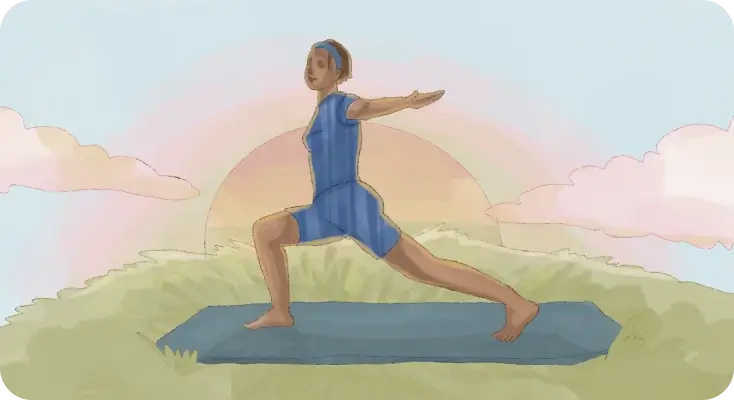
The Fabulous
Are you ready to start the journey? If yes, The Fabulous is here to help.
This might be one of the most useful mental health apps for adults. Why? Because it shows us how small steps can make a big difference.
The Fabulous can help you add structure to your life, build new habits, plan daily routines, and get better every day.
What makes it so fascinating? It is an encouraging and motivation-boosting approach and a perfect graphic.
When building a new habit, you literally feel like you’re going on a pleasant journey. From graphics to inspirational phrases, everything makes this process joyful and rewarding.
Price: 49.99 USD / year
Cons:
- Too much promotion of other apps: There’s nothing wrong with a company offering its other apps, right? But The Fabulous even has a separate tab, “Apps,” which some might consider a little too much.
- You can’t schedule habits only for certain days: For instance, you want to start your morning with stretching only 3 times a week. While the app allows users to customize their habits, you can’t plan them for specific days.
Pros:
- A “contract” you sign, which adds some engagement: This may be one of the best mental health apps in terms of gamification and “a touch of magic.” Once The Fabulous identifies your goals, the app provides you with the “contract” about your well-being that you need to sign up for virtually.
- Lots of variable content: To-do lists, notes, breathing exercises, a gratitude journal, and inspiring illustrations — the app always has something new to discover. The Fabulous even has “Circles,” which are like a tiny channel for communication.
- Great progress tracker: You can track your achievements, discover the percentage of the journey you’ve managed to complete, unlock the next levels, and much more.
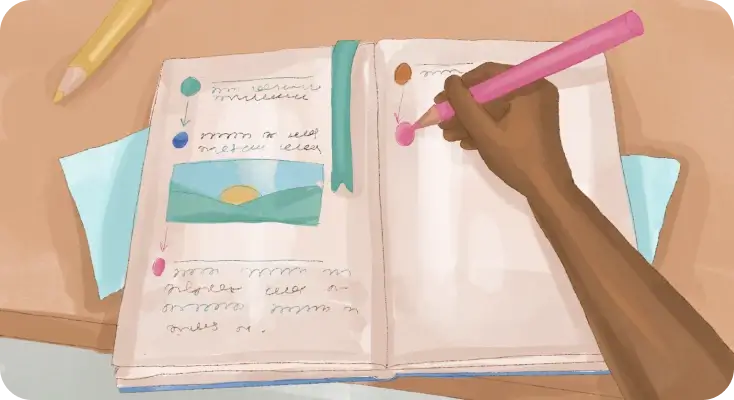
FAQ about the Best Apps for Mental Health
1. Should I use apps to help with mental health?
Mental health apps can be a fantastic resource, offering a range of tools right at your fingertips. They provide a convenient way to get support whenever you need it and can be a great complement to traditional therapy.
Just remember, while these apps can be incredibly helpful, they shouldn’t replace professional treatment for more serious mental health conditions.
Ashley Coon, MA, LPC, states, “I recommend evaluating where you’re currently at with your mental health and identifying areas of need as well as establishing goals. From there, you can choose which above app seems like it will be the best fit for you! If you’re struggling with anxiety, meditation and relaxation apps will likely be helpful for you. If you’re struggling with intense mental health dysfunction, you may be better fit for virtual therapy with BetterHelp.”
2. What health and wellness apps are best for childhood trauma?
While childhood trauma is an experience that’s better to handle with a therapist, you can start small steps. Breeze is the best mental health app to learn more about your current state with a childhood trauma test. You’ll get personalized insights and a well-being plan on how to take care of yourself. If then you decide to start working with a therapist, we suggest opting for BetterHelp or Talkspace.
3. What are the best free mental health apps?
As you’ve already noticed, the list does not include completely free apps, but some have many free features. To begin with, you can choose Breeze, Daylio, or Balance.
4. What mental health game apps will be the most effective?
Gamification is a great way to progress faster. Moreover, different apps use it differently. Breeze has relaxation games to calm down after a difficult day. Daylio offers achievements to collect. At the same time, The Fabulous is a complete journey with game elements.
5. Are mental health apps effective?
Yes, they can be quite effective for many users. Such apps provide a range of features, such as mindfulness exercises, mood tracking, and cognitive behavioral therapy (CBT) tests, which can be very beneficial.
You can always give one a try and check how it influences your well-being!
Ashley Coon, MA, LPC, comments, “Keep in mind that while mental health apps are great resources to utilize, they cannot replace therapeutic services with a mental health professional. If therapy is accessible to you, I always recommend working with a mental health professional to help you in your journey.”
Disclaimer
This article is for general informative and self-discovery purposes only. It should not replace expert guidance from professionals.
Any action you take in response to the information in this article, whether directly or indirectly, is solely your responsibility and is done at your own risk. Breeze content team and its mental health experts disclaim any liability, loss, or risk, personal, professional, or otherwise, which may result from the use and/or application of any content.
Always consult your doctor or other certified health practitioner with any medical questions or concerns
Breeze articles exclusively cite trusted sources, such as academic research institutions and medical associations, including research and studies from PubMed, ResearchGate, or similar databases. Examine our subject-matter editors and editorial process to see how we verify facts and maintain the accuracy, reliability, and trustworthiness of our material.
Was this article helpful?
